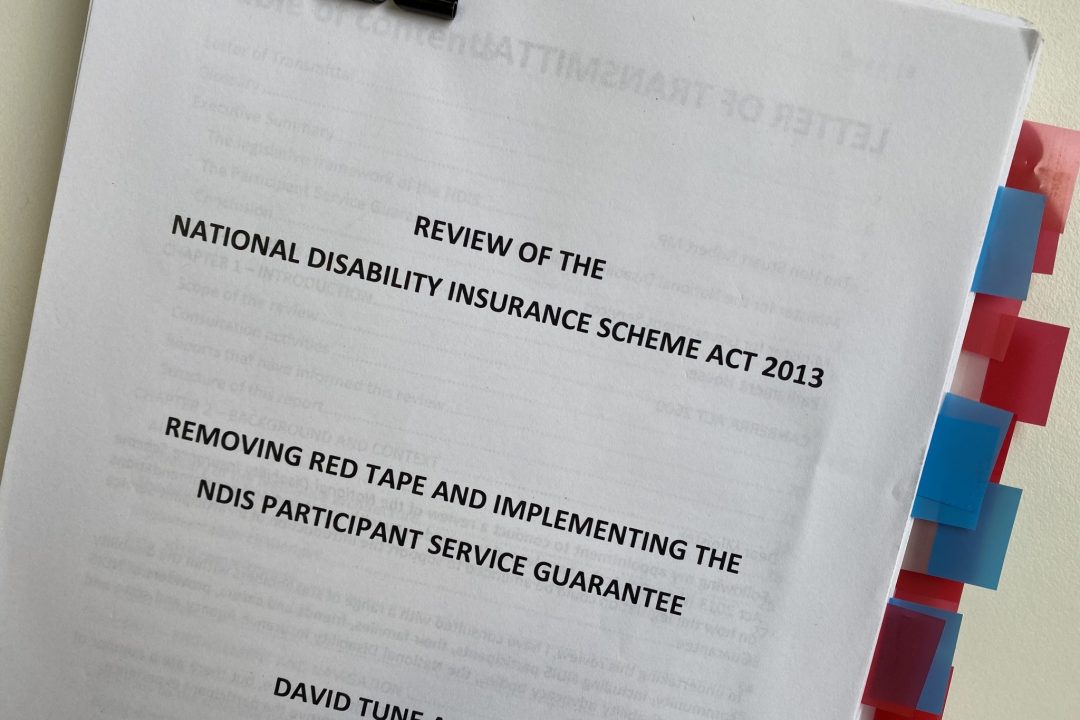
PIAC welcomes many of the recommendations made in the report of the review of the NDIS undertaken by David Tune AO (the Tune Review) and calls for further reform in five key areas.
Senior Solicitor, Chadwick Wong, who leads PIAC’s ‘A Fairer NDIS’ project said that the report is an important step in the development of the NDIS but there remains a need to ensure greater transparency, accountability and fairness for people with disability accessing the NDIS.
The Review found that while the NDIS is helping many participants achieve their goals and aspirations, there remain considerable frustrations expressed about the administration of the Scheme.
‘We are pleased to see that most of the Tune Review’s recommendations respond to community concerns,’ said Senior Solicitor Chadwick Wong.
The report includes a number of recommendations that should be adopted and implemented as soon as possible by the Government. These include the introduction of a Participant Service Guarantee which would set out legislated timeframes for the administration of the NDIS and the issuing of full draft plans, the publication of accessible information, increased outreach for marginalised communities, and additional funding to support people with disability to navigate the NDIS.
‘The Review’s emphasis on improving transparency, and the embedding of transparency and ‘empowering’ as principles under the Participant Service Guarantee, is especially welcome,’ said Chadwick Wong.
‘We continue to call for the publication of Administrative Appeals Tribunal (AAT) settlement outcomes to improve transparency and empower participants.’
‘It is also essential that the typical support packages used by the National Disability Insurance Agency (NDIA) to determine funding for individuals are published,’ said Chadwick Wong.
PIAC remains concerned that the Tune Review has not addressed complex and significant issues for law reform, especially in the following five areas.
Further areas for reform
An important issue not addressed by the Tune Review concerns how the NDIA factors in the financial sustainability of the NDIS when making individual planning decisions. This is a complex issue of legal importance, which needs to be resolved. It is disappointing that the Tune Review has suggested this issue be dealt with in the next review of the legislation, currently scheduled for 2021.
Second, the Tune Review has not addressed in a systemic way the complexity of the various ‘review’ processes. The Review’s own survey found that only 28% of respondents found the review and appeals processes to be clear. The Review observes the complexities in the system, but suggests only that the legislation be amended to remove the multiple uses of the word ‘review’, for clearer forms to be used and better training of staff. While these recommendations are welcome, they do not go far enough in fixing the substantive legislative complexities in the process.
Third, the Review does not address the failure by the NDIA to make changes to its policies following Federal Court or Tribunal decisions. On a number of issues, including on transport and gym membership, NDIA policies are not consistent with decisions handed down by the Federal Court or the AAT. This leads to a waste of time and resources as participants continually re-litigate issues that have already been resolved by earlier Court or AAT decisions.
Fourth, while the Review recognises the reality and impact of delays in the internal review or appeals processes, it does not address financial losses suffered by participants, even where these losses are the result of the NDIA’s defective administration. In particular, there is no basis for back-payment of funds for participants who are successful in their internal review or appeals applications. In these situations, a participant may be out-of-pocket for supports that are ultimately approved by the NDIA. This unfairness ought to be rectified. It is not a matter of imposing financial penalties on the NDIA, but rather the opposite: ensuring participants are not penalised for errors made by the NDIA.
Finally, while the recommendation to clarify the meaning of ‘reasonable and necessary supports’ is welcome, PIAC considers the Review takes the wrong approach to dealing with the interface with other service systems.
The Tune Review recommends that the NDIS Act be amended to clarify that the NDIS is not responsible for funding supports that should be provided through another more appropriate service system, even if the support is not actually being provided. PIAC considers that this may leave users in a bureaucratic neverland. What matters to participants is whether they can, in fact, get access to ‘reasonable and necessary’ supports. The NDIA should not be able to deny access to a support on the basis of another service system being more appropriate to provide the support, if that other service system does not in fact provide that support. This does not mean that the NDIS must fund the support requested – the other ‘reasonable and necessary support’ criteria must still be met. It simply means the NDIS cannot refuse support to a participant on the basis of another service system that does not actually provide the support requested.
These issues are set out in more detail in our submission to the Tune Review, and in our Issues Paper.
The Government now has a critical opportunity to address shortcomings in the NDIS. PIAC calls on the Government to implement the Tune Review recommendations quickly as the next step in developing the NDIS, while also addressing the range of outstanding issues identified by PIAC and other advocates.